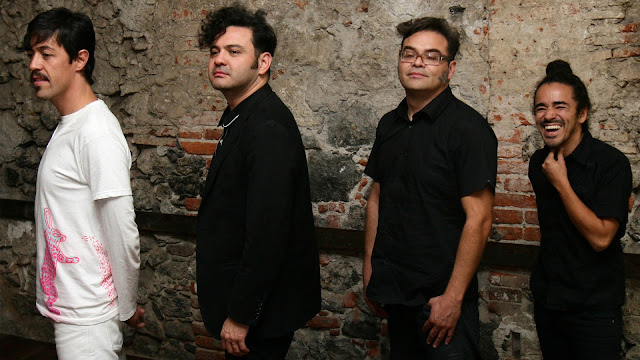M U S I C / WmW 2h 21 m
if you want excitement PRESS SHUFFLE!
if you want excitement PRESS SHUFFLE!
LISTEN THE PLAYLIST ON DEEZER.COM
1991-2001
The Cape Verdean singer was the preeminent force of morna music, which combines fado, jazz, and Latin. A native of the island nation of Cape Verde, Cesária Évora was known as the country's foremost practitioner of the morna, which is strongly associated with the islands and combines West African percussion with Portuguese fados, Brazilian modhinas, and British sea shanties.
Mar Azul 3:38
Cabo Verde 3:14
from Mar Azul 1991
From Cesaria Evora's opening wail on Mar Azul's title track, one knows that this disc, a short set comprised of only eight songs, is going to be something special. This is the album that won Evora the praise of Paris, and was released prior to her international hit, Miss Perfumado. These are classic mornas at their most haunting -- all the songs are devastating, slow-burning, and stellar. The subject matter is about love, loss, and the heartbreak of life in Cape Verde. The music is acoustic, with guitars, sweeping pianos, and the occasional horn or violin to augment the effect. The liner notes set up the image of Evora ("Cize," as she is known to those close to her) as she prepares to sing in a smoky Cape Verdean nightclub. The overlying feel of this album is that of a dark and intimate seaside bar, under a starry sky, featuring a beloved singer who woos the audience with her dreamy, mesmerizing voice. Highlights include the haunting "Mar Azul," the elegantly moody "Cabo Verde,"... and its heartbreaking finale, "Separacao." This truly original and understated album burns with the underlying ferocity of an emotional roller coaster, and introduced to the world the mornas of Cape Verde and their most famous interpreter, Cesaria Evora.
Singer/songwriter Kiko Veneno was born in Figueres, Spain, and later settled in Sevilla making his live debut at a local university in 1971. After participating in a duet called Kiko y Germán, he joined brothers Rafael and Raimundo Amador to form Veneno, a flamenco/pop act that disbanded a year later. In 1981, Kiko Veneno made his first solo record, Seré Mecánico por Tí...
Lobo López 4:55
Echo de Menos 3:47
from Échate un cantecito 1992
...A seminal but erratic artist, Veneno benefited here from the key support of Radio Futura's Santiago Auserón and producer Joe Dworniak, and was thus able to focus his talents for a set that included classics such as "Lobo López," "En un Mercedes Blanco," "Echo de Menos," and "Joselito."...
Listeners who learn the name of this band will in the process learn an old Hungarian proverb, meaning "the end of pains," and normally used to describe the situation when someone dies. Neither of the words is actually Hungarian -- "kampec" is Yiddish, "dolores" is Latin -- but the band itself has been the most successful touring Hungarian rock band since the collapse of the Soviet Eastern bloc in the mid-'60s.
Tű fokán 4:41
Jeges hevület 4:04
Ödögök 3:38
from Tű fokán - Eye Of The Needle 1993
...For the following decade Kampec Dolores toured the entire European continent more than two dozen times. Musically the group started with the kind of new wave, post-punk styles that were prevalant in the '80s. The musicians worked with many different influences from ethnic music and avant-garde music including free improvisation. The vocalist Gabi Kenderesi developed her own style of scat singing, using made-up languages and extended vocal techniques. She is also a fine violinist...
At the forefront of the Rock en Español movement, the band mixes rock, punk, electronics, and the occasional traditional Mexican flavoring. The Mexican quartet has remained one of the biggest acts on the Latin music scene since, inspiring two generations of rockers in their wake...
El Aparato (Rubén Albarrán) 3:18
Esa Noche (Elorza Rangel) 3:28
El Fin de la Infancia (Joselo Rangel) 2:18
El Puñal y el Corazón (Rubén Albarrán) 4:21
from Re 1994
For Re, Café Tacuba experimented with different styles and sounds, resulting in one of the most wildly varied releases of the '90s... Re proves that Café Tacuba is lyrically and musically more adventurous than most of its '90s peers.
...The band employs a standard rock lineup of guitar/bass/drums with vocals, certainly, but the members also incorporate electronics as well as exotic instrumentation into their music, which encompasses styles as divergent as punk and ballads, as well as regional Mexican sounds like norteña, cumbia, ranchera, and even mariachi and electronica, indie pop, and garage rock. .. While critics look at these reasons to signify Café Tacuba's importance, legions of global music followers are enamored with them simply because of their music, which is broadly appealing not only because of its groundbreaking nature, but also because of it's fun, madcap, and ever-changing...













